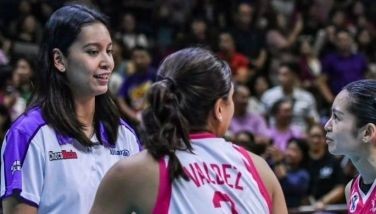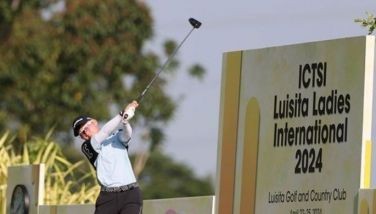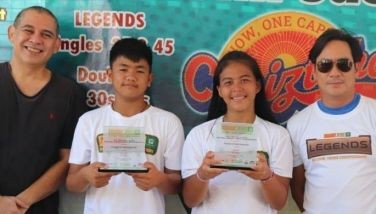Recalling the ’78 World Cup

Only two Asian countries have hosted the FIBA World Cup, known as the FIBA World Championships until last year’s edition. The Philippines was the first in 1978 and Japan the second in 2006.
In 17 FIBA World Cups, countries from the Americas have hosted 10 and Europe five, including the last two in Turkey in 2010 and Spain last year. The first five hosts were from South America – Argentina in 1950, Brazil in 1954, Chile in 1959, Brazil in 1963 and Uruguay in 1967. Puerto Rico from Central America hosted in 1974 while Canada from North America in 1994. The US from North America hosted in 2002. European hosts were Yugoslavia in 1970, Spain in 1986, Athens in 1998, Turkey in 2010 and Spain in 2014.
The Philippines would’ve hosted its first World Cup in 1963 but then President Macapagal denied visas for delegations from Yugoslavia and Communist countries. That prompted the Philippines’ first suspension by FIBA. Brazil took over the hosting job that year, its second in four stagings.
Manila was given another chance to host in 1978 and this time, it came off without a hitch. Former Asian Basketball Confederation (now FIBA Asia) secretary-general Mauricio (Moying) Martelino was the finance head of the project. Martelino had been involved in bowling but in 1968, was brought over to basketball by Lito Puyat and Honesto Mayoralgo. Puyat was the president of the Basketball Association of the Philippines (BAP), the SBP’s precursor, and Mayoralgo the secretary-general. “Lito and Nes took me in because I had no connections whatsoever with anyone in basketball,” said Martelino. “They wanted a new face to handle finance.” It started an enduring love affair for Martelino with the sport he grew to love with a passion. Martelino is now 79 and will be 84 when the FIBA World Cup is staged in 2019.
Martelino said the 1978 tournament introduced the use of the digital shot clock. “It was the first time that the World Championships had a shot clock that was down to a tenth of a second,” recalled Martelino. “In the last three minutes of every quarter, the Seiko timekeepers made sure we were looking at a fraction of a second. In the game for the bronze medal, Brazil hit a buzzer-beating halfcourt shot to beat Italy by one. Without the new time system, we wouldn’t have been able to confirm right away that the last shot came within time.”
Martelino said the organization of the 1978 World Championships went like clockwork. “We were lucky that Ka Doroy (Valencia) was chairman of the finance committee that raised funds for the event,” he said. “Ka Doroy was very persuasive. At that time, the Araneta Coliseum had an exclusive contract with a soft drink brand. But Ka Doroy got a major sponsorship from a competing soft drink brand. Somehow, he was able to pull it off. Then, he had a raffle selling P1 a ticket for 10 Toyota cars that were on display at the Rizal Park. Ka Doroy convinced Pabling Carlos, who worked with the Silverios, to donate the cars.”
* * *
Martelino said then FIBA secretary-general Borislav Stankovic and the founding FIBA secretary-general Renato William Jones attended the competitions. The yearly Jones Cup in Taiwan is held in the late Jones’ honor. “Both Mr. Jones and Mr. Stankovic were impressed with the way we hosted,” said Martelino who served as Asian secretary-general for nine years and as BAP secretary-general for 12. “Mr. Jones called it the most exciting World Championships ever. Even if neither the Philippines nor the US played in the final or the battle for third, the Araneta Coliseum was packed to the rafters. That was a clear indication of our pure love for the sport. In the final, Yugoslavia beat Russia by one in overtime and Marcel DeSouza hit that halfcourt shot to lead Brazil to a one-point win over Italy for the bronze. Both games were classic.”
Martelino said it was the first time that the World Cup delegations were billeted in a five-star hotel (Philippine Plaza) and designated a coach, called the Love Bus, each.
Nic Jorge was the coach of the Philippine squad that was seeded into the eight-team semifinals in the tournament. The Philippine team was made up of Alex Clarino, Steve Watson, Ed Merced, Padim Israel, Mon Cruz, Bokyo Lauchengco, Cesar Teodoro, Joy Carpio, Nat Castillo, Greg Gozum, Pol Herrera and Cesar Yabut. The Philippines failed to win a single game and registered a 0-7 record but finished eight of 14 because of its direct seeding into the semifinals. The Philippines lost to Russia by 47, Yugoslavia by 16, Brazil by 47, Italy by 37, USA by 30, Canada by 11 and Australia by 45.
Cagayan de Oro City Mayor/SBP chairman Oscar Moreno said he watched the 1978 final in the bleacher section, using his allowance to pay for a ticket. He was a student at the time. Because of his love for the game, Moreno inched his way into the crowded stadium to witness history in the making.
* * *
The other night, Martelino, Jorge and Moreno were at the Makati Shangri-La Hotel to attend a dinner hosted by PLDT chairman/SBP president Manny V. Pangilinan for the visiting FIBA evaluation committee that was in town on an inspection tour in connection with the country’s bid to host the 2019 FIBA World Cup. What an uncanny coincidence that an organizer, coach and spectator of the 1978 event were together in now pitching for the Philippines to host the 2019 edition.
FIBA evaluation committee chairman Lubomir Kotleba said he wasn’t in Manila for the 1978 tournament but his brother played on the Czechoslovakian national team. The stars in the Czech squad were Kamil Brabenec, Stanislav Kropilak and Zdenek Kos. Czechoslovakia finished ninth. “When my brother came home, he told me about the Philippines, how this beautiful country loves basketball, that I had to visit one day,” said Kotleba. Sure enough, Kotleba eventually saw for himself the Filipinos’ passion for the game with every visit. In 2008, Kotleba was in the country for referee seminars and last year, was back in his role as an ambassador of quality officiating.
Kotleba said he turned to becoming a referee after he wasn’t successful as a player and coach. The Slovak worked over 4,000 games as an arbiter up to 1989. He served as an international referee for 14 years and was assigned to two finals in three Olympics. Kotleba also worked in five World Championships as a referee. As a commissioner, he supervised five Olympics and 22 World Championships. Kotleba was in charge of the FIBA World Cup draw in Barcelona last February.
Kotleba speaks eight languages. Perhaps, he will add another – Pilipino – if and when the Philippines hosts the 2019 World Cup. Kotleba didn’t experience the electrifying atmosphere of the 1978 tournament which Manila hosted. Perhaps, he will experience a reprise at an exponentially higher level if and when the Philippines hosts the 2019 World Cup.
- Latest
- Trending






























